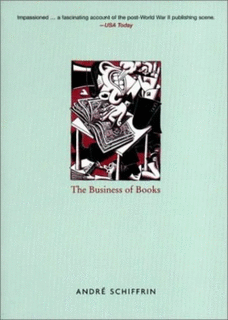
I have finally got round to reading André Schiffrin's excellent book on the impact business practices have had on publishing in the latter half of the Twentieth Century. This book is required reading for anyone who cares how knowledge is disseminated to the public. Market Censorship and Focus Groups effectively kill any ideas that appear fresh and new. It is only through independent publishing houses and booksellers that unique ideas and different perspectives on life are allowed the time of day. From my perspective, of working in college radio for 11+ years, the public needs access to varied arenas to nurture alternate views. Too often, people assume the only kind of music that's out there is played on the larger commerical stations. This kind of mass marketing of ideas and sounds crushes public taste by 'dumbing it down' and not allowing it to develop. People need to have the opportunity to gravitate towards sounds and ideas they prefer. It should be a fundamentally organic process, not something which is force fed to people. How can one determine what appeals to himself or herself if he or she does not have access to a variety of choices? People are effectively crippled if they cannot discuss matters sensibly. How can a person make an informed decision if he or she is denied information? André Schiffrin's book deals with all of these ideas by his personal journey through contemporary publishing. He has produced an essential text for studying the way the culture industry works.
********************
from the Verso website (www.versobooks.com)
The Business of Books: How the International Conglomerates took Over Publishing and Changed the Way We Read
André Schiffrin
Postwar American publishing has been ruthlessly transformed since André Schiffrin joined its ranks in 1956. Gone is a plethora of small but prestigious houses that often put ideas before prof it in their publishing decisions, sometimes even deliberately. Now six behemoths share 80% of the market and profit margin is all.
André Schiffrin can write about these changes with authority because he witnessed them from inside a conglomerate, as head of Pantheon, co-founded by his father bought (and sold) by Random House. And he can write about them with candor because he is no longer on the inside, having quit corporate publishing in disgust to setup a flourishing independent house, the New Press. Schiffrin's evident affection for his authors sparkles throughout a story woven around publishing the work of those such as Studs Terkel, Noam Chomsky, Gunnar Myrdal, George Kennan, Juliet Mitchell, R.D.Laing, Eric Hobsbawm and E.P. Thompson.
Part-memoir, part-history, here is an account of the collapsing standards of contemporary publishing that is irascible, acute and passionate. An engaging counterpoint to recent, celebratory memoirs of the industry written by those with more stock options and fewer scruples than Schiffrin, The Business of Books warns of the danger to adventurous, intelligent publishing in the bullring of today's marketplace.
"It is at once a riveting chronicle of the qualitataive rise and fall of the American reader and a very personal book." – Village Voice
"Andre Schiffrin is an old-fashioned New York publisher, the sort that loves and believes in books. Not just best-sellers, but little books with big ideas." – The Times
"André Schiffrin presents a sombre portrait of American publishing where the pursuit of profit has strangled alI creativity." – Nouvel Observateur
André Schiffrin was, for thirty years, Publisher at Pantheon. He is the Director of the New Press, which he founded in 1993. He contributes a regular column on publishing to the Chronicle of Higher Education.



No comments:
Post a Comment